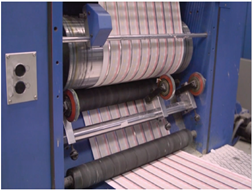Part 4 of our series of topics from Your Complete Brand Protection Guide by Authentix. Our guide helps brands develop holistic and secure brand protection strategies and solutions that safeguard their company, products, customers, and revenue.
Having an external brand protection partner allows companies to have an entire team of experts in their corner providing custom brand protection solutions built for each company’s unique situation using the most advanced technology paired with expert analysis.

A brand protection partner will be able to share valuable insights and analytics to make further recommendations for what next steps your company can take to combat counterfeits.
The right security technology should come from a company with sufficient industry experience, technical skills, implementation capabilities, and ongoing program management to properly support the program for multiple years.
Qualified brand protection solution providers will work with individuals, teams and vendors to develop, implement, and manage a proactive strategy to cover all company objectives. The following factors should be considered when vetting potential partners:
Industry Knowledge and Expertise: It’s critical that the authentication partner offers consultative services, has experience with the company’s products, and understands their industry inside and out. The partner should fully understand the company’s challenges, articulate exact problems and work to set goals for the program. In this way, a trusted relationship can be established that will provide:
- Common vision for the goals, resources and time management of the authentication plan
- Covert, machine-readable inks detected in the field by inspection staff with appropriate readers
- Forensic markers only detected under laboratory analysis
Customized Solution Offerings: Companies should select an authentication partner who can fully customize a solution to fit not only the unique challenges of their industry, but also the needs of the specific organization. The partner should have the necessary expertise on what types of security features are needed for different types of product packaging, such as tamper-evident seals, foils, labels, etc. This will allow the company to take a proactive approach in combating counterfeit products. Companies need a partner who offers:
- State-of-the-art color marking systems
- Multilayered security features
- Monitoring and enforcement
- Ability to function properly in a multi-channel distribution environment
- Data capabilities – dashboards and cloud platforms
Multilayered Approach and Implementation Support: Ensure the provider offers consultative services, implementation ownership, and ongoing program support after the program is launched.
Decades of experience have proven that there is not a simple “silver bullet” technology that can be applied to all products for perfect brand protection security. As discussed earlier, a multilayered approach in which overt, covert, and forensic features are applied in various ways is the most effective long-term solution against counterfeiting.

Supply Chain Integration: More than likely, the company’s current supply chain is complicated and has many moving parts. A good authentication partner should be able to instantly integrate within that chain. In addition, the partner should be a “third-party agnostic” solution integrator without any prejudice toward other links in the supply chain. This partner will be able to objectively analyze the supply chain, identify where potential problems lie, and make recommendations on correcting them. A provider should have the following attributes:
- Third-party printer, logistic partner certification and support
- Integration with existing systems and manufacturers
- Trial runs with actual samples for testing purposes/quality assurance
Talent and Reach: The partner should have technical and commercial teams to provide the appropriate level of experience required to authoritatively advise on the features of their technology and its implementation. In the case of a global brand, the provider should have a global footprint. This includes global reach for delivery, servicing, technical support, dealing with customs, and regulatory expertise to handle regional and country-based compliance issues.
Implementation: An experienced authentication partner should be able to certify and conduct print trials with the company’s manufacturing printers. All manufacturing of security materials should be produced in a secure facility under a full chain-of-custody protocol. A security audit is the best way to determine this. The brand owner must be confident that appropriate physical security and auditing procedures are maintained in the potential partner’s facility. It is important to only work with a partner with quality accreditations appropriate for the subject matter and technologies involved.

Some potential partners might be great at strategy and planning and not-so-great at implementing those plans. It’s important that the partner provides extensive documentation of their experience in implementing a strategy, including a resume consisting of several multi-year customer relationships.
In addition, the partner must understand the company’s business inside and out, become an integrated part of the team, and extend that support to third-party vendors. Companies need a partner who is flexible enough to adapt to their culture, challenges and processes. A good implementation strategy should encompass:
- Execution across the entire global supply chain
- Training and enablement for all involved parties
- Flexibility to expand and grow with changing needs
Commitment: An authentication partner must be willing to see a company through the good times and challenging times, too. An ongoing relationship with the partner allows the company to stay one step ahead of counterfeit issues. An established, trusted strategy is the only way the brand protection program can sustain long-term success. It should include:
- Dedicated project manager to handle programs
- Security features testing
- Ability to retain sample programs to ensure consistency
- Ongoing reports and result interpretation that provide actionable insights
- Regular auditing of third-party vendors for proper use of security materials
Employing an effective brand protection solution brings a wide range of benefits to businesses. Improving sales and revenue is always important in any industry. By eliminating infringements and counterfeits, a company can increase revenue and market share.
For a more complete guide to brand protection- why it is necessary, how infringement harms brands and customers, how to develop and implement an effective program, and insights into the brand protection strategies of the future – download our Complete Brand Protection Guide.
READ PART 1 | READ PART 2 | READ PART 3
About Authentix
As the authority in authentication solutions, Authentix can help brands create a customized plan to tackle counterfeit products from every angle, collect actionable data, and protect brands and consumers. Authentix works with each company to determine which brand protection solutions are right for their situation.
Authentix brings enhanced visibility and traceability to today’s complex global supply chains. For over 25 years, Authentix has provided clients with physical and software-enabled solutions to detect, mitigate, and prevent counterfeiting and other illicit trading activity for currency, excise taxable goods, and branded consumer products. Through a proven partnership model and sector expertise, clients experience custom solution design, rapid implementation, consumer engagement, and complete program management to ensure product safety, revenue protection, and consumer trust for the best known global brands on the market. Headquartered in Addison, Texas USA, Authentix, Inc. has offices in North America, Europe, Middle East, Asia, and Africa serving clients worldwide.
